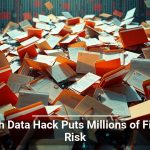 Think ransomware locking your files is your non-profit's worst IT nightmare? There’s a newer, potentially more devastating threat emerging: Data Extortion.
Think ransomware locking your files is your non-profit's worst IT nightmare? There’s a newer, potentially more devastating threat emerging: Data Extortion.
Hackers are changing tactics. Instead of just encrypting your systems, they're increasingly stealing your most sensitive data – confidential donor information, private beneficiary records, internal financials – and threatening to leak it publicly unless you pay a hefty ransom.
Imagine the gut-wrenching fear: not just operational disruption, but the potential public exposure of the very people you serve and the donors who trust you. No decryption key can fix a shattered reputation or mend broken trust. This isn't just ransomware 2.0; it's a direct attack on your non-profit's integrity and mission. And attacks like these are rising rapidly.
The Rise Of Data Extortion: Why Your Non-Profit's Data is the New Target
Hackers realize that for many organizations, especially non-profits, the data itself is more valuable leverage than locked systems.
Here’s the typical scenario:
- Silent Data Theft: Intruders breach your network – often quietly – and copy vast amounts of sensitive information: donor lists and giving histories, confidential client case files, employee records, grant proposals, financial statements.
- The Extortion Threat: Instead of locking your files, they contact you threatening to publish this stolen data online (often on the dark web) or sell it to other criminals unless you pay their ransom demand.
- Bypassing Some Defenses: Because they aren't always encrypting files immediately, these attacks can sometimes evade security tools focused solely on detecting traditional ransomware activity.
Why Data Extortion is Especially Dangerous for Non-Profits:
While disruptive for any organization, data extortion poses unique existential threats to non-profits:
- Catastrophic Reputational Damage & Loss of Trust: If donor financial data or highly sensitive beneficiary information (health details, personal stories, immigration status, etc.) is leaked, the damage to your non-profit's reputation could be irreparable. Donors may flee, community trust evaporates, and rebuilding credibility can take years, if it's possible at all. This is often a non-profit's greatest asset.
- Compliance & Funding Nightmares: A public data breach almost certainly triggers serious compliance violations under regulations like CPRA (California) or potentially HIPAA (if you handle health info). This can lead to crippling fines, mandatory notifications that further damage reputation, and make you ineligible for crucial grants or government funding. Funders expect you to protect sensitive data.
- Crippling Legal Fallout: Leaked data can easily lead to lawsuits from donors, beneficiaries, or even staff whose personal information was compromised. For a budget-conscious non-profit in Los Angeles, the legal fees alone could be crippling.
- The Never-Ending Threat: Unlike some ransomware where payment might get your files back, paying data extortionists offers no guarantee they've deleted their copies. They can return months or years later, demanding more money under the same threat, creating an ongoing cycle of fear and vulnerability.
Why This Shift? Easier Pressure, More Profit.
Stealing sensitive data can be technically easier and faster than encrypting entire systems. More importantly, the threat of leaking confidential non-profit data – impacting vulnerable people or betraying donor trust – creates immense emotional and ethical pressure on leadership, potentially making payment seem like the only option to prevent immediate, devastating harm. Non-profits might also be perceived as having fewer resources for robust defense, making them attractive targets.
Warning: Your Current Defenses Might Not Be Enough
If your security strategy primarily focuses on backups and basic antivirus/firewalls to stop encryption, you are vulnerable to data theft. Hackers are adept at:
- Stealing login credentials (passwords!) through phishing emails targeting staff or volunteers.
- Finding weaknesses in cloud storage configurations (like Dropbox, Google Drive, SharePoint) to access and download files quietly.
- Disguising data theft as normal network activity to slip past older security tools.
Protecting Your Mission, Donors, and Beneficiaries from Data Extortion
It’s time to evaluate your defenses with data theft specifically in mind:
- Adopt a Zero Trust Mindset: Assume any access request could be a threat until verified. Strictly control who can access what sensitive data (donor records, client files, financials). Use strong Identity and Access Management (IAM). Multi-Factor Authentication (MFA) for all accounts (especially email and financial) is non-negotiable.
- Implement Advanced Threat Detection & Data Loss Prevention (DLP): Basic antivirus isn't enough. You need modern security tools (like advanced Endpoint Detection and Response - EDR) that can actively monitor for suspicious data movement and potentially block unauthorized transfers before sensitive files leave your control. This requires smart investment, focused on protecting your most critical data.
- Encrypt Sensitive Data (Everywhere): If data is stolen, make it unreadable and useless to the thieves. Encrypt confidential files both when stored ("at rest") on servers or computers, and when being sent ("in transit") via email or file sharing. This is often a core compliance requirement.
- Maintain (and Test!) Robust Backups: Backups are still essential for recovering systems if they are wiped or damaged during an attack, but remember they do not prevent the initial data theft. Ensure you have offline or immutable backups, and regularly test that you can restore from them quickly.
- Prioritize Security Awareness Training: Your staff and volunteers are a critical defense layer! Train them continuously on recognizing phishing scams, using strong passwords, handling sensitive data appropriately, and reporting anything suspicious immediately.
Is Your Non-Profit Prepared for This Evolving Threat?
Data extortion is a serious and growing risk, particularly for mission-driven organizations entrusted with sensitive information. Protecting against it requires a proactive and layered security approach.
Don’t wait until your non-profit's critical data and reputation are on the line.
Start with a FREE, No-Obligation Network Assessment. Our cybersecurity experts understand the unique challenges and responsibilities of Los Angeles non-profits. We'll evaluate your current defenses against data theft, identify vulnerabilities, and recommend practical, proactive measures tailored to your organization's needs and budget.
Click Here to Schedule Your FREE Los Angeles Non-Profit Network Assessment Today!
Protecting your data is protecting your mission. Let's ensure your cybersecurity strategy is ready for today's threats.





